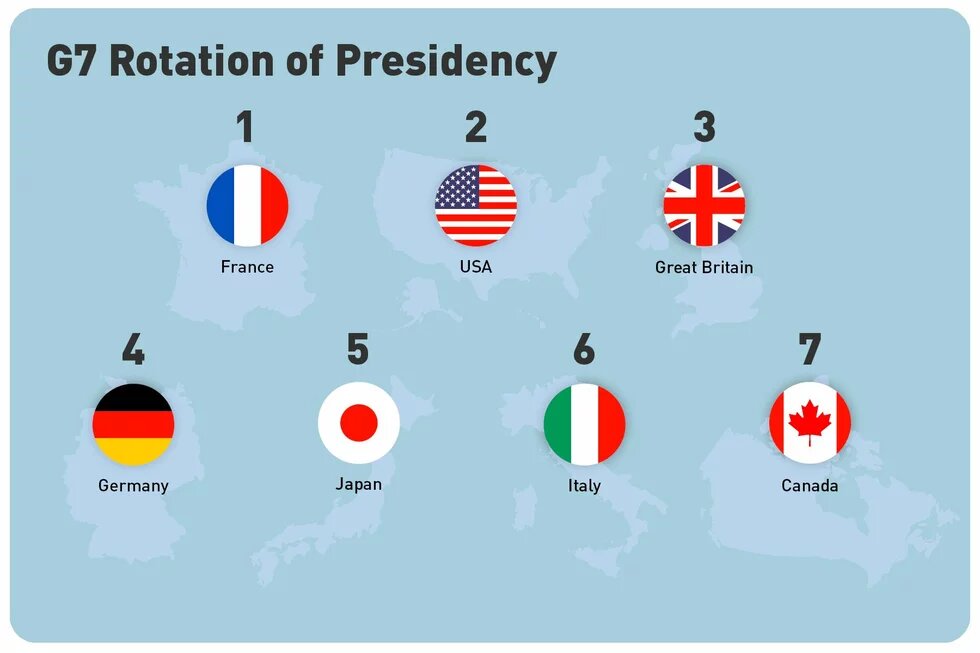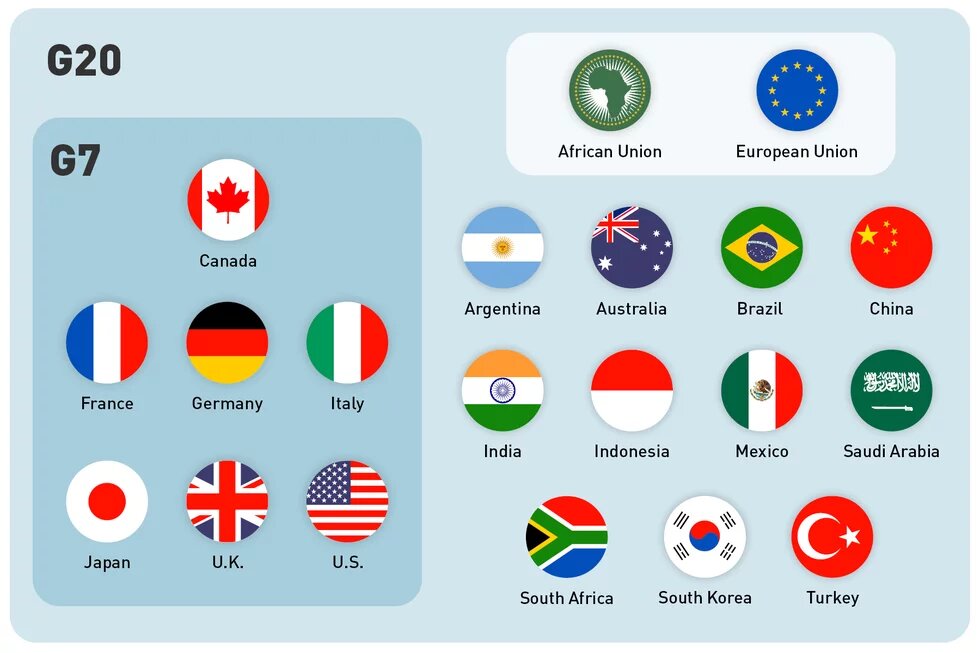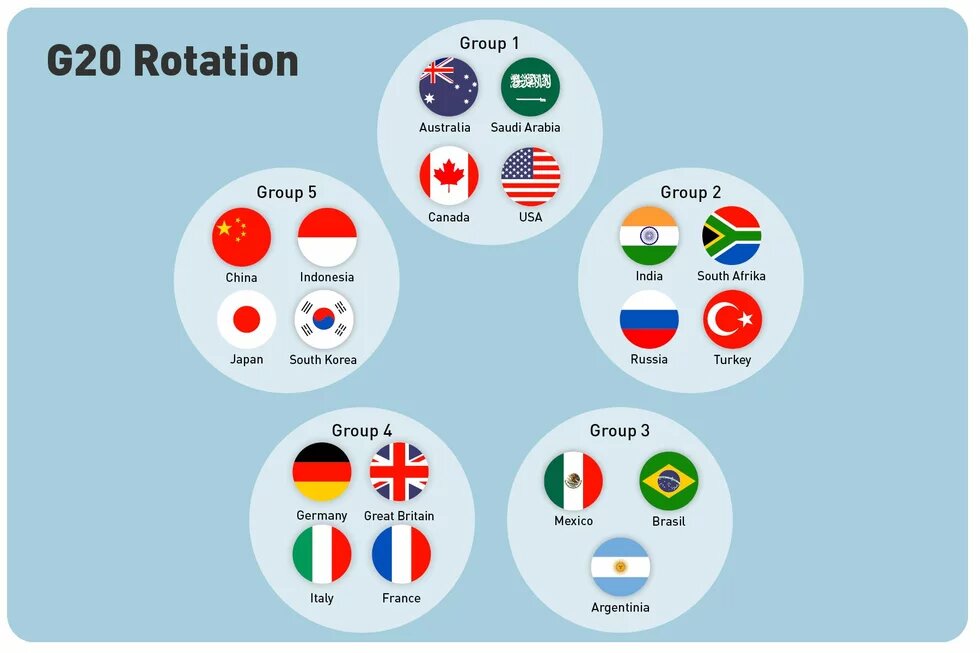
The Group of Seven (G7) and the Group of Twenty (G20) are informal governance clubs, which hold annual Summits of Heads of State and many ministerial meetings to discuss issues of global importance.

The G7 and G20 are considered informal because they were not established by an international treaty and do not have a permanent secretariat. Instead of having their own administrative apparatus, the member states take turns hosting the summit meetings and the associated ministerial meetings that precede them.
The agendas of the two clubs overlap partially. The G7 generally engages in more political and security-related issues. The G20 in the beginning focused on global economic and finance governance, but expanded its scope to include trade, climate change, sustainable development, health, agriculture, energy, environment, climate change, and anti-corruption.
In 2025, the presidencies of the G7 and G20 Summits are held by Canada and South Africa, respectively. The South African G20 Presidency in 2025 was the first held by an African nation.
Membership
All G7 member states are also represented in the G20, making the G20 more diverse.
The G7 is comprised of wealthy, democratic member countries: the United States, the United Kingdom, France, Italy, Japan, Canada, and Germany. The EU has observer status. The Group first met as the G6 in 1975 to address the oil crisis and recession. Canada and Russia joined in 1976 and 1998, respectively. Following the 2014 Russian annexation of Crimea, the G7 nations suspended Russia’s membership.
The G20 is comprised of the G7 countries including the European Union, plus originally twelve countries of global economic and political importance. In 2023, the African Union joined as a full member. The G20 was launched in 1999 at the level of Finance Ministers and Central Bank Governors. Since the Global Financial Crisis in 2008, it takes place at the Heads of State level. The G20 summit and the preparatory processes – often including more than 60 ministerial and working group meetings per year – are coordinated by the respective host country.
Rotation in G7
The G7 presidency rotates annually according to a fixed order among member countries. The role is not subject to deliberation or election. The presiding nation is responsible for setting the agenda and organizing meetings of senior officials and ministers in the lead-up to the summit, as well as hosting the summit itself. The G7 summits usually take place in June or July.
Regional Groups and Rotation in G20
Each December, a different G20 member country assumes the presidency. On 1 December 2024, South Africa took over as host and President of the G20 for 2025, joining the so-called G20 Troika—comprising the previous, current, and upcoming presidencies. In this case, the Troika includes Brazil (2024), South Africa (2025), and the United States (2026).
The G20 presidency rotates annually according to a system of country groups. The 19 member states (with the EU and AU as additional members not assigned to a group) are divided into five groups of up to four countries each. These groups are largely organized on a regional basis, with two exceptions: Group 1 (Australia, Canada, the USA, and Saudi Arabia) and Group 2 (India, Russia, South Africa, and Turkey).
Each year, the presidency passes to a country from a different group, a principle introduced in 2010, when South Korea assumed the presidency. Within a group, all countries are eligible, and members must agree among themselves who will take on the role. Domestic political factors (such as elections) and broader geopolitical considerations often influence the choice.
Holding the G20 presidency brings international visibility and prestige. The presiding nation also has significant influence over shaping the agenda, in consultation with other members and in response to global economic developments. G20 summits are typically held in November or December, though the timing can vary.
Reaching Consensus
The G20 brings together a highly diverse group of members representing around 80 percent of the world’s population, which makes finding common ground inherently difficult. In today’s fragmented geopolitical landscape, reaching consensus has become even more challenging. Moreover, G20 summit declarations are non-binding and often remain only partially implemented.
The G7, while less diverse than the G20, also struggles to maintain unity—particularly under the current U.S. administration of Donald Trump. For example, in July 2025, the group managed to agree on a common stance regarding the conflict between Israel and Iran, but not on Russia’s ongoing war in Ukraine. Overall, the G20’s influence has waned in today’s increasingly multipolar world.
Get more information
- Heinrich Boell Foundation, Washington, DC Office, including its dossiers.
- For additional economic data on G7/G8 and G20 consult DESTATIS.
- Outcome of Italian G7 Summit (2024)
- Outcome of Brazilian G20 Summit (2024)
- University of Toronto G7 and G20 Information Center
This article was part of our dossier "G20 in Focus". Last update: January 2026.


